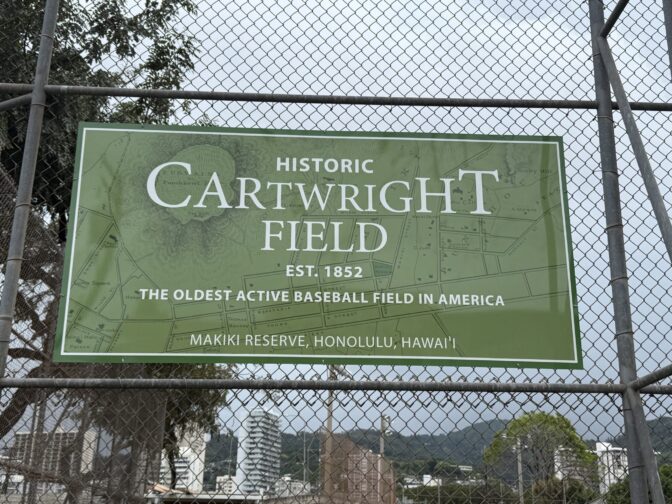By Staff Reports
(OʻAHU) – Mayor Rick Blangiardi joined historians and dozens of local baseball supporters at Cartwright Neighborhood Park in Makiki on Thursday to officially recognize the site as ‘The Oldest Active Baseball Field in America.’ The celebration was held on the 205th anniversary of the birthday of Alexander Joy Cartwright, Jr., widely considered the father of modern baseball and a distinguished leader in Hawai‘i’s history.
In 1852, on a parcel of land that would later be renamed Cartwright Neighborhood Park, Alexander Cartwright introduced several foundational elements of baseball that still define the game today. These innovations included the diamond-shaped field, 90-foot base paths, nine-player teams and nine-inning games — standards that continue to shape America’s pastime.
173 years later, that field — now called Cartwright Field — remains an active baseball facility that is used by athletes of all ages, rightfully earning it the distinction of being the oldest baseball field in the nation.
“Alexander Joy Cartwright is a national treasure, and it is only fitting that this park bearing his name be forever recognized as the birthplace of baseball as we know it,” said Honolulu Mayor Rick Blangiardi.
Thursday’s event included a ceremonial first pitch and the unveiling of commemorative signage that acknowledges this national historic distinction. In a special highlight, Mayor Blangiardi issued an official proclamation declaring April 17, 2025, as “Alexander Joy Cartwright Jr. Day” in the City and County of Honolulu, honoring Cartwright’s lasting legacy and foundational role in shaping the game of baseball.
“Sports and recreation are essential to the well-being of our communities, and preserving the spaces where we gather to play, compete, and connect is part of our kuleana,” said Mayor Rick Blangiardi. “Cartwright Park continues to serve as a living tribute to Cartwright’s extraordinary legacy and the enduring spirit of baseball in Hawai‘i. We are also deeply grateful to the individuals and organizations who help keep this park vibrant and welcoming.”
In recognition of their continued efforts to preserve and share Cartwright’s legacy, Mayor Blangiardi also made a special presentation during the event to The Friends of Alexander Joy Cartwright, Jr., Anna Cartwright — Cartwright’s great-great-granddaughter — and the leaders of the Honolulu Fire Department, who were each presented with commemorative Louisville Slugger baseball bat to honor their commitment to maintaining the field’s history and spirit.
The event also recognized the valued public-private partnership with organizations like Mālama Kīpuka Hawai‘i, which has played a vital role in enhancing and maintaining the park. Their contributions include regular maintenance, field upgrades, murals, and commemorative installations honoring Cartwright’s life and achievements.
Beyond his pivotal contributions to baseball, Cartwright was also a civic pioneer. He served as the first appointed Chief of the Honolulu Fire Department and held positions of influence and trust as a Queen’s Hospital trustee, advisor to Queen Emma and King David Kalākaua, and a founding member of key institutions such as the Hawai‘i Library, the Hawai‘i Chamber of Commerce, and Bishop National Bank (now First Hawaiian Bank).
“On behalf of my entire family and our beloved kūpuna, it is a profound honor to witness this historic moment, recognizing Cartwright Park as a landmark in the story of baseball — not only in Honolulu, but across the nation as the oldest active baseball field in America,” said Anna Cartwright. “I am deeply grateful to Mayor Blangiardi, the City and County of Honolulu, the Honolulu Fire Department, the Friends of Alexander Cartwright, Rob Iopa, Mālama Kīpuka, Professor Jay Martin, and everyone in the baseball community who has played a role in preserving and honoring the legacy of this park.
This tribute to my great-great-grandfather and the field he laid out 173 years ago reflects not only a significant chapter in baseball history, but also the enduring connection our family shares with this ʻāina and the community. As a fifth-generation kamaʻāina, this moment is especially meaningful. It reminds us that the spirit of baseball—with its values of camaraderie, sportsmanship, and joy—has been deeply woven into the fabric of our islands, continuing to echo across generations and inspire the ballplayers of tomorrow.”
Although Cartwright’s legacy lives on through the games played at this historic field, his final resting place is at O‘ahu Cemetery, where baseball fans continue to leave tokens of appreciation—baseball gear and ho‘okupu—in his memory.
Hauʻoli lā hānau, Alexander Joy Cartwright Jr. — and play ball!

